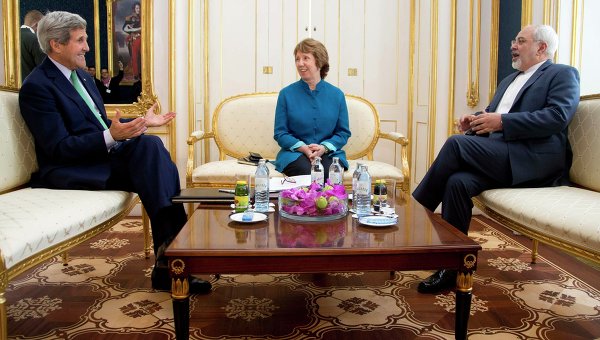LATEST: Iranian Brigadier General Killed in Syria
Iran’s Foreign Minister Mohammad Javad Zarif has said that nuclear talks in Vienna, seeking a comprehensive agreement before a November 24 over Tehran’s program, have been “very difficult” but progress has been made.
Zarif met US Secretary of State John Kerry and the European Union’s foreign policy chief Catherine Ashton for six hours on Wednesday, and talks between high-level officials of Iran and the 5+1 Powers (US, Britain, Germany, France, China, and Russia) continued on Thursday.
“It was very difficult, serious and intensive…but instead of focusing on problems, we discussed solutions as well. There was progress in all the fields,” Zarif said.
However, he cautioned, “We still need serious discussions over various issues.”
No date was set for the next meeting between Iran and the 5+1 Powers, but Zarif said technical talks will resume within 1-2 weeks and he will see Kerry and Ashton “in three to four weeks’ time in a city other than Vienna”.
The two sides are seeking a resolution before the expiry of interim arrangements on November 24.
Zarif stepped back from hints by President Rouhani and Iran’s lead negotiator, Deputy Foreign Minister Abbas Araqchi, that the deadline could be extended: “We only have 40 days left….None of the negotiators find [an] extension of talks appropriate. We share this view… and we think there is no need to even think about it.”
Reliable sources indicate that many of the issues which have divided Iran and the 5+1 Powers have been resolved or put to the side. Concerns over the under-construction Arak heavy-water reactor have been assuaged by Tehran’s promise of a re-design to sharply reduce plutonium by-product, and the long-running question of “possible military dimensions” of Iran’s program has receded.
However, there has been no progress on the central issue of Iran’s number and level of centrifuges for uranium enrichment. Tehran continues to insist on a significant expansion of its capacity, while the US and some European powers continue to demand a cut.
(Featured Photo: US Secretary of State John Kerry, European Union’s Catherine Ashton, and Iranian Foreign Minister Mohammad Javad Zarif, October 15, 2014)
Iranian Brigadier General Killed in Syria
Iranian State media have confirmed a report, circulating for days on social media, that a senior Islamic Revolutionary Guards Corps commander has been killed in Syria.
IRNA reported that the body of Brigadier General Jabbar Darisawi was buried in Ahvaz Province in southern Iran on Thursday.
IRNA gave the formulaic report that the general was killed “defending the Sayyeda Zainab Mosque” in southern Damascus — the default location for the death of any Iranian military personnel in the country.
However, Syrian opposition activists say Darisawi died in fighting for the village of Handarat, north of Aleppo. Regime forces have been trying to push insurgents out of the area, cutting off a key route to opposition fighters inside Syria’s largest city.
Darasawi was reportedly the head of Basij units in Khuzestan Province in southwestern Iran.
(Cross-posted from Syria Daily)
Supreme Leader: “A War of Destiny Against Israel Must Be Decisive”
As Tehran shifts its backing from Hamas to Islamic Jihad in the Israel-Palestine dispute (see Thursday’s Iran Daily), key lines from the Supreme Leader’s meeting with the head of Islamic Jihad, Ramezan Abdullah:
War against the Zionist regime is a war of destiny, and it must be decisive. The enemy should have the same concerns in the West Bank as it has from Gaza.
Ayatollah Khamenei repeated his declaration that Palestinians must be armed to resist the Israelis.
Abdullah responded: “Certainly, the victory [in this summer’s 50-day war with Israel] happened because of the Islamic Republic’s support. Had it not been for Iran’s strategic and effective support, resistance and victory could not have been achieved in Gaza.”

